Please activate JavaScript in your browser to use all interface options.
World Wildlife Day Celebrated on March 3
03 March 2021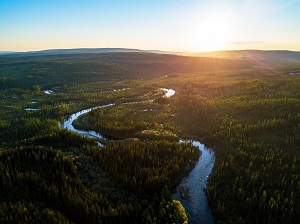
Today celebrates World Wildlife Day, established by the UN General Assembly in 2013. This initiative is aimed at drawing additional attention to the need to preserve and protect wild flora and fauna.
Environment protection is an integral part of the Company’s corporate culture and operations. To achieve the best performance in this area, Rosneft is constantly improving its approaches to environmental management, increasing the scale of environmental measures and the necessary investments in environmental protection. The Company’s green investments amounted to 120 billion roubles over the past three years.
One of the important areas of Rosneft’s activities is the preservation and restoration of forests. Demonstrating its commitment to achieving the UN Sustainable Development Goals, the Company is implementing a comprehensive reforestation programme. Rosneft and its subsidiaries planted more than 1.5 million trees in 2020 and more than 3.5 million saplings in the past three years.
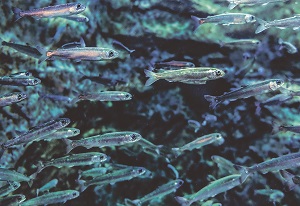 Caring for aquatic biological resources is another important priority of the Company’s environmental agenda. Rosneft is aimed at the rational use of water resources as part of its activities and takes a set of measures to protect and replenish them. In 2020, more than 60 subsidiaries of the Company released over 65 million fry of various fish species (Siberian sturgeon, muksun, peled, salmon, etc.) into the river systems of Russia.
Caring for aquatic biological resources is another important priority of the Company’s environmental agenda. Rosneft is aimed at the rational use of water resources as part of its activities and takes a set of measures to protect and replenish them. In 2020, more than 60 subsidiaries of the Company released over 65 million fry of various fish species (Siberian sturgeon, muksun, peled, salmon, etc.) into the river systems of Russia.
Taking care of the conservation of wildlife and maintaining the sustainable state of ecosystems, the Company also implements a number of programmes for the study and conservation of wild animals in the regions of its presence.
Since 2015, Rosneft has been implementing a programme to preserve the biological diversity of marine ecosystems at its license areas in the Russian Arctic zone. The programme includes activities aimed at researching the marine environment, observing indicator species of flora and fauna, scientifically based assessment of the ecological sensitivity of the territory and habitats, collection and analysis of information on the state of the environment, and much more.
Rosneft is implementing a programme to study and preserve polar bears, Atlantic walruses, wild reindeer and ivory gulls. These species belong to the so-called biological indicators; the state of their population and migration routes can effectively assess the stability of the Arctic ecosystem as a whole.
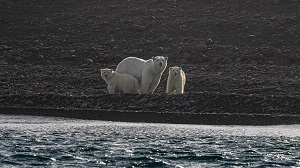 The polar bear is one of the main species--indicators of the sustainable condition of Arctic ecosystems, standing at the top of the food chain. One of the main tasks of polar bear research is to assess the current state of populations. During the expeditionary work carried out by Rosneft, a complex of studies is conducted, including accompanying ship observations and registration of encounters with polar bears, non-invasive collection of biological samples from encountered individuals and marking them with satellite beacons. Over the past period, more than 500 encounters with polar bears have been registered, more than 30 animals have been examined in detail, more than 500 biological samples have been selected and analysed.
The polar bear is one of the main species--indicators of the sustainable condition of Arctic ecosystems, standing at the top of the food chain. One of the main tasks of polar bear research is to assess the current state of populations. During the expeditionary work carried out by Rosneft, a complex of studies is conducted, including accompanying ship observations and registration of encounters with polar bears, non-invasive collection of biological samples from encountered individuals and marking them with satellite beacons. Over the past period, more than 500 encounters with polar bears have been registered, more than 30 animals have been examined in detail, more than 500 biological samples have been selected and analysed.
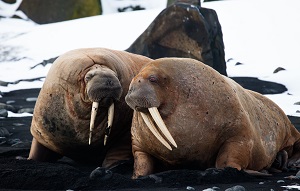 Rosneft is a member of the Expert Advisory Council for the Study and Conservation of the Atlantic Walrus and supports research on its population. Regular observations have been carried out since 2016, and in 2019 unique data on the distribution, rookeries, and migration routes of the Atlantic walrus subspecies on the islands of Matveev, Dolgiy, and Golets in the Pechora Sea were obtained. During the expedition with the Company’s participation in 2020, most of the known walrus haulouts were surveyed on the Franz Josef Land archipelago as well as the Orange Islands and Victoria Island, and marine bottom ecosystems were studied to assess their food supply.
Rosneft is a member of the Expert Advisory Council for the Study and Conservation of the Atlantic Walrus and supports research on its population. Regular observations have been carried out since 2016, and in 2019 unique data on the distribution, rookeries, and migration routes of the Atlantic walrus subspecies on the islands of Matveev, Dolgiy, and Golets in the Pechora Sea were obtained. During the expedition with the Company’s participation in 2020, most of the known walrus haulouts were surveyed on the Franz Josef Land archipelago as well as the Orange Islands and Victoria Island, and marine bottom ecosystems were studied to assess their food supply.
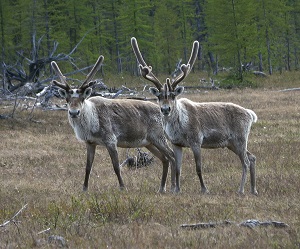 Since 2014, Rosneft has annually supported studies of wild reindeer migration in the Evenki and Taimyr districts of Krasnoyarsk Krai. Reindeer are the foundation of the entire ecosystem of the Arctic North and the most important component of the traditional livelihood of the indigenous peoples of the North. The study obtained data on the full annual cycle of animal migration and identified seasonal features of their movement depending on weather conditions and other habitat factors.
Since 2014, Rosneft has annually supported studies of wild reindeer migration in the Evenki and Taimyr districts of Krasnoyarsk Krai. Reindeer are the foundation of the entire ecosystem of the Arctic North and the most important component of the traditional livelihood of the indigenous peoples of the North. The study obtained data on the full annual cycle of animal migration and identified seasonal features of their movement depending on weather conditions and other habitat factors.
In 2020, Rosneft began a comprehensive study of the Ivory gull. The Ivory gull is a rare bird species listed in the Red Book of Russia. 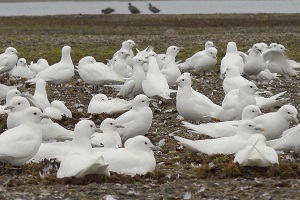 The remoteness and inaccessibility of the bird’s habitat and nesting places greatly complicate research, which until recently has been fragmentary. The expedition in 2020 took place on Wiese Island in the Kara Sea and took about two months, covering the entire nesting period of the ivory gulls. Aerial observations and ground surveys of nesting places were conducted, and photo traps were installed in the territory of the bird colony. This will provide scientists with unique data on the movements of the ivory gulls.
The remoteness and inaccessibility of the bird’s habitat and nesting places greatly complicate research, which until recently has been fragmentary. The expedition in 2020 took place on Wiese Island in the Kara Sea and took about two months, covering the entire nesting period of the ivory gulls. Aerial observations and ground surveys of nesting places were conducted, and photo traps were installed in the territory of the bird colony. This will provide scientists with unique data on the movements of the ivory gulls.
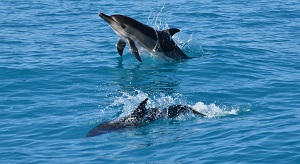 Rosneft, together with scientists from the Shirshov Institute of Oceanology, initiated a three-year project to study Black Sea dolphins in 2018. Two full-scale marine expeditions along the coast of Krasnodar Region, each about 1,000 km long, were conducted as part of the project. Based on the results of the expeditions, mapping charts of the seasonal distribution of cetaceans were compiled. In addition, qualitative and quantitative descriptions of the sound signals of the Black Sea dolphins living in the wild were made for the first time.
Rosneft, together with scientists from the Shirshov Institute of Oceanology, initiated a three-year project to study Black Sea dolphins in 2018. Two full-scale marine expeditions along the coast of Krasnodar Region, each about 1,000 km long, were conducted as part of the project. Based on the results of the expeditions, mapping charts of the seasonal distribution of cetaceans were compiled. In addition, qualitative and quantitative descriptions of the sound signals of the Black Sea dolphins living in the wild were made for the first time.
Rosneft supports programmes for studying and preserving the Amur tiger population of the Amur Tiger Centre. The Company finances the purchase of necessary machinery and equipment for state wildlife officers who monitor specially protected natural areas in Primorsky and Khabarovsk Krais. 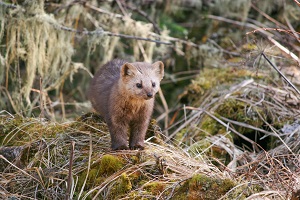 Rosneft also supports centres for the rehabilitation and reintroduction of the Amur tiger, feeding and veterinary support of animals, and provides special equipment for training tigers released into the wild to hunt independently and to co-exist with humans without conflict.
Rosneft also supports centres for the rehabilitation and reintroduction of the Amur tiger, feeding and veterinary support of animals, and provides special equipment for training tigers released into the wild to hunt independently and to co-exist with humans without conflict.
The Central Siberian State Natural Biosphere Reserve regularly studies the movements of the Siberian sable on the territory of the Evenki district of Krasnoyarsk Krai. The obtained data make it possible to develop recommendations for the rational use of sable, contributing to the conservation of its population and sustainable socio-economic development of the region.
Rosneft
Information Division
March 3, 2021

-315xx70.png)

